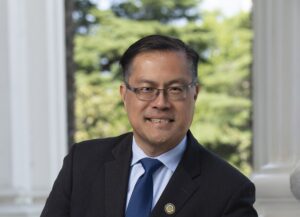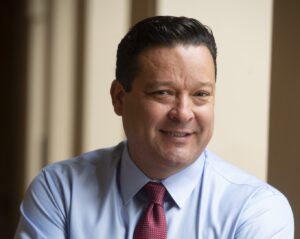
Assemblyman Fong and Mayor Gordo Discuss the Future of Work
Pam Sornson, JD
November 7, 2023
Attendees at the recent Future of Work Conference, hosted by the Economic and Workforce Development Division of Pasadena City College (PCC EWD), were very fortunate to hear from speakers representing all levels of government: state, regional, and local.
California’s 49th District Assemblyman Mike Fong joined PCC EWD Vice President Salvatrice Cummo in welcoming the crowd of ~200 guests.
Stewart Knox, Secretary of California’s Labor & Workforce Development Agency, provided the opening Keynote remarks, then ably moderated the event’s first panel of EWD professionals.
Pasadena City Mayor Victor Gordo joined Panel #1 to discuss how his career as a labor lawyer informs his advocacy for enhanced educational and career entry and ladder opportunities across all of his city’s ethnic populations.
Together, they provided significant insights and information about how California, Los Angeles County, and the City of Pasadena are individually addressing workforce development initiatives within their respective boundaries. The first article in this edition of the Pulse featured Secretary Knox’s presentation. In this article, we are sharing the inputs provided by Assemblyman Fong and Mayor Gordo.

Assemblyman Mike Fong
Assemblyman Fong’s 49th District (one of 80 in the state) encompasses the western side of the San Gabriel Valley, including nine cities (Alhambra, El Monte, Arcadia, Monterey Park, Rosemead, San Gabriel, San Marino, South Pasadena, and Temple City) as well as three unincorporated areas (East Pasadena, North El Monte, and South San Gabriel). The district is home to almost half a million people (~462,000), 85% of whom identify as Asian or Latino.
In his role as Assemblyman, Mr. Fong is a passionate advocate for advancing employment and workforce initiatives that impact all of his constituents. He sits on multiple committees, including those addressing economic concerns (banking and finance, budget, higher education, and trade and investment, to name just four), as well as diversity and equity issues that are focused on the well-being of disabled and unhoused people, ethnic communities (Asian, Pacific Islander, Mexican), and the LGBTQ+ community.
To conferencegoers, Mr. Fong was highly complementary about the work being done across the region supporting workforce development goals. He noted that the businesses that populate the region’s 11 primary industry clusters (Aerospace, Biosciences, Entertainment, Trade, Advanced Transportation, Design, the ‘Ocean’ Economy, Fashion & Apparel, Tourism, Information Technology, and Food Manufacturing) all benefit from the increasingly sophisticated collaborations between their participants and the colleges and training programs that provide their labor force.
He also touched on the importance of ensuring that all possible workforce members receive the support they require to achieve their personal and occupational goals. Those with challenges, such as physical, health, or economic impediments, need additional resources to move up in the world, and Fong is working to ensure that there are appropriate community resources available to help them do that. He sees the trades (those in the construction industry, in particular) as drivers of economic growth, and training programs that feed these occupations will contribute much to the future economy. “The speed of change is rapid,” Fong asserts. “California’s governments are in tune with these demands and are actively collaborating with in-the-field, local partners to address their challenges.”

Pasadena Mayor Victor Gordo
A long-time advocate for workers, Mayor Gordo works diligently with ‘both sides’ to make meaningful and fruitful connections between labor and industry. Ironically, both of those ‘sides’ – workers and the businesses that hire them – cite the same concerns about economic growth opportunities: there are not enough resources available for people or organizations to find the means to move forward. He says he’s also very aware of the lack of communication between the two groups – workers don’t know of available jobs or training programs, while employers with staffing problems need help finding qualified employees. In many cases, a lack of information about trade and skill development programs stymies potential workers from finding the support they need to find well-paying work. From Gordo’s perspective, improving the communications channels for both potential labor force members and the companies that employ them will help to alleviate the stress the city now experiences due to unfilled job positions.
His insights on the complexity of building a workforce in Pasadena, in particular, flow from his own life experience. A Mexican native, Mayor Gordo has lived in Pasadena since emigrating to the country as a young boy. His parents (a dishwasher and seamstress) worked hard to provide a good life for their six children; Gordo himself contributed to the family fortunes by delivering the Pasadena Star-News newspaper for eight years (from age nine to 17). As the first of his family to graduate college (he’s an alum of PCC), he went on to earn a law degree and entered politics in 2001, representing District 5. He was elected Mayor in November 2020.
In this role, Gordo is tasked with managing city growth in these unprecedented times. “The bio- and biotech industries are growing, and Pasadena offers resources that support this aspect of the expanding healthcare sector. They need more workers, however, and we’re looking at how to attract young people to these career options.” His challenge is that the City does not yet have a fully vested system to make these labor-demand connections. “We need to forecast where we’re going and share that information with the [young people who need to hear it].”
Throughout his career, Gordo’s focus has remained steadfast on the welfare of the city’s underserved populations. In addition to his role as Mayor, Gordo acts as General Counsel and Secretary-Treasurer of Local 777 of the Laborers’ International Union of North America (LIUNA). He sees the unions as significant assets for current and future growth, and works with those representatives to build both entry-level and career-climbing opportunities for learners not interested in pursuing a traditional ‘college’ education. Secretary Knox commented with a smile on how often Mayor Gordo reaches out to his office for support and resources on behalf of his Pasadena constituents.
These three elected officials, Pasadena City Mayor Victor Gordo, California 49th District Assemblyman Mike Fong, and Labor and Workforce Development Secretary Stewart Knox, ably represent the interests and ambitions of thousands of California’s workers and businesses. Their contributions to the 5th Annual Future of Work Conference are highly valued and greatly appreciated.


